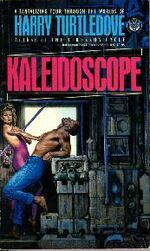| "Bluff" | |
|---|---|
 | |
| Author | Harry Turtledove, as Eric G. Iverson |
| First Appearance | Analog |
| Collected | Kaleidoscope |
| Genre(s) | Science Fiction |
| Publication date | February 1985 |
"Bluff" is a science fiction short story written by Harry Turtledove under the name Eric Iverson, first published in Analog, February 1985; reprinted in Terry Carr's Best Science Fiction of the Year #15, edited by Terry Carr, Tor 1987; Kaleidoscope, Del Rey, 1990; 3xT, Baen, 2004. "Bluff" takes its inspiration from the work of Professor Julian Jaynes, whose 1976 work, The Origin of Consciousness in the Bicameral Mind first theorized that early man was not conscious, or self aware; rather, such a state of consciousness developed only gradually.
Turtledove follows that conclusion by having an advanced, futuristic Terran spacecraft (populated by scientists that only have the Latin language as a lingua franca) land on an alien planet just beginning to develop river-based civilizations similar to that of ancient Egypt or Mesopotamia. This early civilization is without people who are able to conceive of themselves independently; rather, they take all real direction from 'gods' that they hear audibly in their minds.
Two of the Terran scientists, Ramon Castillo and Xing Mei-lin, begin to discover the lack of consciousness or independent thought among the alien civilization, and theorize that those who have the least conversations with their 'gods' are traders and soldiers, those who have had extended contact with foreigners with other gods and ideas, and are closer to beginning to conceive of themselves as independent others. Following the theories of Professor Jaynes, Castillo and Mei-lin surmise that eventually the aliens will develop a sense of individual consciousness, something that occurs as the Terrans introduce an alien soldier to the game of poker.
Experiencing a "bluff" for the first time, the alien soldier becomes painfully aware of the idea of lying or withholding information, something that requires a sense of self or consciousness. The story ends with this soldier visualizing himself killing the current king and seizing power, something that had been utterly unthinkable before he had developed a sense of independent consciousness.
Literary Comment[]
"Bluff" utilizes Jaynes' theories directly and even cites his work directly in the text. When the original story was published in Analog, Jaynes himself sent Turtledove a response, saying that he genuinely enjoyed the use of his theories in a science fiction story, to Turtledove's immense relief.
See also[]
- Between the Rivers, a fantasy novel set in a quasi-Mesopotamian society where people often hear the voices of ancestors and gods in their heads.
- Noninterference, a novel set partly in a Bronze Age society on another planet visited by human space travelers in the future of OTL.
| ||||||||
| |||||||
